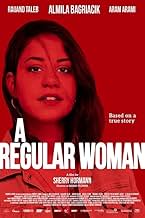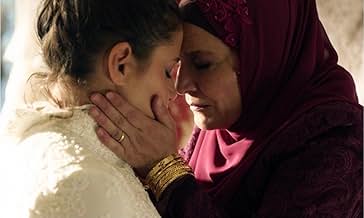IMDb-BEWERTUNG
7,6/10
2740
IHRE BEWERTUNG
Das Schicksal der deutschen Türkin Hatun Ayhrun Sürücü und ihr Kampf für ein freies, selbstbestimmtes Leben gegen den Widerstand ihrer Familie.Das Schicksal der deutschen Türkin Hatun Ayhrun Sürücü und ihr Kampf für ein freies, selbstbestimmtes Leben gegen den Widerstand ihrer Familie.Das Schicksal der deutschen Türkin Hatun Ayhrun Sürücü und ihr Kampf für ein freies, selbstbestimmtes Leben gegen den Widerstand ihrer Familie.
- Regie
- Drehbuch
- Hauptbesetzung
- Auszeichnungen
- 2 Gewinne & 3 Nominierungen insgesamt
Empfohlene Bewertungen
It could have been great, the first person narrative after the crime compromised the storytelling
What does that even mean? Just a woman? Of course you can interpret it yourself, but if you ask me, this is about how a female is being viewed. And not just with a radical islamic family. Don't just get that out of the movie and feed your xenophobic fears and anxieties. No this is a general point that is unfortunately true - in the public eye, be it the media or society itself. See what recently happened to Meghan Markles interview and how it got under scrutiny. Certain individuals not believing what she said ... which is horrible on so many aspects.
But back to this, because while I read the general struggle of women, this does specify what it is to be under a very strict rule - or rather rules. How it is to grow up and be part of something radical - something that will not acknowledge you as an individual, but as part of something greater. Something that women are supposed to bend to and behave accordingly to.
It is irritating and I hope it does open the eyes of some, what abuse (not just physical, but also) females have to go through. What it does to them - and not all have the strength or the patience to keep fighting against injustices. It is upon all of us to not just look the other way. Like the scene in the bus - everyone minding their business. Which I understand to a degree - people don't know what a fight is about. But when a man hits a woman who obviously is not fighting back ... there is something inherently wrong with that picture ... and while the movie does not linger on it, the point is clear! No one is there to help ... the inevitable end (of a true story, that I was not aware of, but certainly isn't just a single case, but likely has happened to other women ... way too many of them) ... A gripping story that really is able to touch you - and as I said above hopefully gives you some food for thought
But back to this, because while I read the general struggle of women, this does specify what it is to be under a very strict rule - or rather rules. How it is to grow up and be part of something radical - something that will not acknowledge you as an individual, but as part of something greater. Something that women are supposed to bend to and behave accordingly to.
It is irritating and I hope it does open the eyes of some, what abuse (not just physical, but also) females have to go through. What it does to them - and not all have the strength or the patience to keep fighting against injustices. It is upon all of us to not just look the other way. Like the scene in the bus - everyone minding their business. Which I understand to a degree - people don't know what a fight is about. But when a man hits a woman who obviously is not fighting back ... there is something inherently wrong with that picture ... and while the movie does not linger on it, the point is clear! No one is there to help ... the inevitable end (of a true story, that I was not aware of, but certainly isn't just a single case, but likely has happened to other women ... way too many of them) ... A gripping story that really is able to touch you - and as I said above hopefully gives you some food for thought
Sibel Kekilli played a character inspired by Sürücü in the 2010 movie "When we leave", which was infinitely better than this one. That film's director Feo Aladag is herself of migrant origin, whereas Sherry Hormann is German and mostly known for television and romantic comedies. This explains the distinct lack of subtlety. "A regular Woman" has an artificial feel, whereas "When we leave" is a deep psychological view of a woman who has to go through such an ordeal. Kekilli's performance is the strongest of her career - she was cast for "Game of Thrones" after that - and mirrors her own life (she is of Kurdish origin, and her family cut her loose when she left the house). The actress here lacks charisma and goes through the motions like performing on a high school stage.
As someone who lived in Berlin and had many Turkish friends and relationships, I can confirm that everything in this film is factually true. It does, however, leave out the accompanying factors of this situation. For instance, the Kurds are a particularly close-knit community because of their persecution in Turkey; since Kurdish was forbidden in public use, there has been no higher education in that language. That explains why migrant Kurds often appear particularly traditional. Also, religious fanaticism is a way for them to connect to other Sunni Muslim expats who otherwise resent them, like Turkish nationalists. Given that the film does show how indoctrination in German mosques happens, this is a missed opportunity - one of many.
All in all, "A Regular Woman" recounts an important story in a lackluster, box-checking way that does not do Hatun Sürücü's legacy justice. There is a German phrase to describe well-meant, but overly zealous and therefore ineffective measures - "Holzhammermethode", using a wooden hammer. It sums up this film quite appropriately.
As someone who lived in Berlin and had many Turkish friends and relationships, I can confirm that everything in this film is factually true. It does, however, leave out the accompanying factors of this situation. For instance, the Kurds are a particularly close-knit community because of their persecution in Turkey; since Kurdish was forbidden in public use, there has been no higher education in that language. That explains why migrant Kurds often appear particularly traditional. Also, religious fanaticism is a way for them to connect to other Sunni Muslim expats who otherwise resent them, like Turkish nationalists. Given that the film does show how indoctrination in German mosques happens, this is a missed opportunity - one of many.
All in all, "A Regular Woman" recounts an important story in a lackluster, box-checking way that does not do Hatun Sürücü's legacy justice. There is a German phrase to describe well-meant, but overly zealous and therefore ineffective measures - "Holzhammermethode", using a wooden hammer. It sums up this film quite appropriately.
A movie about the fate of a woman, who leaves islam. Very moral and unfortunately true.
The enemies of religion have corrupted Islam so much with lies that a woman's life has become more worthless than a dog in the street, what a pity. There is no justice in so-called Muslim countries. And it never will be. You should definitely watch. An exemplary movie.
Wusstest du schon
- WissenswertesBased on the life of Hatun "Aynur" Sürücü, who was murdered in 2005.
Top-Auswahl
Melde dich zum Bewerten an und greife auf die Watchlist für personalisierte Empfehlungen zu.
- How long is A Regular Woman?Powered by Alexa
Details
- Erscheinungsdatum
- Herkunftsland
- Offizieller Standort
- Sprachen
- Auch bekannt als
- Die Frau auf der Straße
- Drehorte
- Produktionsfirmen
- Weitere beteiligte Unternehmen bei IMDbPro anzeigen
Box Office
- Weltweiter Bruttoertrag
- 10.786 $
- Laufzeit1 Stunde 30 Minuten
- Farbe
- Seitenverhältnis
- 1.85 : 1
Zu dieser Seite beitragen
Bearbeitung vorschlagen oder fehlenden Inhalt hinzufügen



![Trailer [OV]](https://m.media-amazon.com/images/M/MV5BYjYxN2U5NjktZjk1YS00MTA3LWEyOWQtNjIzMWY5MWQ2NTAzXkEyXkFqcGdeQXRyYW5zY29kZS13b3JrZmxvdw@@._V1_QL75_UX500_CR0)






















